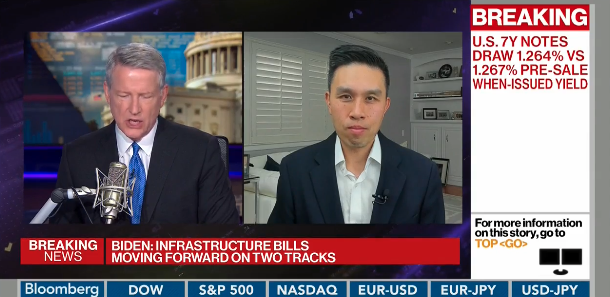ICYMI: Opening Up Medicare Could Add Nearly $400 Billion To Deficit, Raise Medicare Tax Rate By 285 Percent

WASHINGTON – In case you missed it, Lanhee J. Chen, Ph.D. – one of the authors of a new report which finds lowering the Medicare eligibility age could come with unaffordable costs and negative consequences – appeared on Bloomberg television to discuss the report’s findings.

To View The Interview, CLICK HERE Or On The Screenshot Above
‘Medicare At 60’ Could Come With Near $400 Billion Price Tag & Unaffordable Costs :
- The report, “Fiscal Costs of Medicare at 60” finds that by lowering the Medicare eligibility age to 60, gross Medicare expenditures could rise by $82.9 billion in 2022 while the federal deficit could rise by $32.2 billion in 2022 and $393.9 billion over the next ten years.
- To finance “Medicare at 60,” Congress could pursue various tax increases.
- Congress could raise the additional Medicare tax rate by 285 percent in 2022, setting it at 3.5 percent in addition to the 2.9 percent for the standard Medicare payroll tax.
- Congress could also raise the standard Hospital Insurance (HI) tax, which would impact many more Americans. In 2022, the tax rate would need to be 3.25 percent—a 12 percent increase in the current rate.
- CHEN: “We look at this proposal to lower the eligibility age of Medicare to 60 and we find that there are significant fiscal impacts—several of hundreds of billions of dollars over the next ten years. Perhaps more concerning is the impact on the Medicare Hospital Insurance trust fund, which is the trust fund that pays for inpatient hospitalization through Medicare—the possibility that that trust fund might be exhausted two years earlier, so 2024 instead of 2026.”
Expanding Medicare Raises More Questions Than Policymakers Have Answers For Regarding Risks To Affordability & Access For Seniors:
- CHEN: “We asked some questions. I think the policymakers need to address these questions. [Medicare at 60 is] a policy that sounds very enticing and easy. The basic point we make is, there are impacts, there are massive questions to be answered about the design of the program and more importantly, the impact on seniors who are in Medicare currently.”
Building On What’s Working in Health Care Would Be More Effective Than Creating ‘Medicare at 60’:
- CHEN: “I think the idea of getting people into the marketplaces that exist already makes sense, and I think the concept of subsidizing that coverage is also a reasonable one. I think the issue is, if you’re talking about trying to cover people who are uninsured, expanding the Medicare eligibility age doesn’t really get you a whole lot of the way there, because you’re really only talking about 10 percent of the population that’s eligible for that expansion [that] is actually currently uninsured.”
The report by Chen and his colleagues, Tom Church and Daniel L. Heil, which was supported by the Partnership for America’s Health Care Future, warns of potential tax increases to pay for “Medicare at 60” among other consequences. To learn more, read Chen, Church and Heil’s full report HERE.